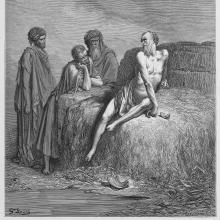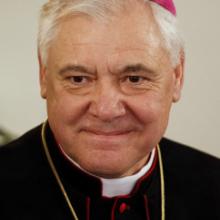Gustavo Gutierrez
Reagan and John Paul helped spell doom for the Soviet empire, and the pontiff waged a decades-long campaign inside the church — helped by his doctrinal chief, Cardinal Joseph Ratzinger, who would later become Pope Benedict XVI — to quash liberation theology and silence its most ardent supporters.
Today, however, it’s a wholly different story — and to listen to the Rev. Gustavo Gutierrez, the Dominican priest from Peru who is known as the father of liberation theology, one might wonder what all the fuss was about.
The world of Christian theology has seen its fair share of writings that address horrible suffering and the confusion about God’s character that it causes. The question has been on my mind in light of the Philippines’ calamity. Although satisfying answers are difficult to come by with a topic like this, I offer a few insights that have helped me to continue to trust God’s love. The biblical character of Job shows us how, as believers in a loving God, we should regard and respond to suffering around us.
It no longer surprises me when I hear people express cynicism and doubt about a caring God — I sometimes wonder why more Christians have not done so. Whose faith can remain undisturbed when Typhoon Haiyan kills 5,000 Filipinos and inflicts misery on thousands more? I recall a photo of a woman weeping by her child’s body inside a damaged church. Who can imagine her despair? Can we conceive of the hell endured in the same region by enslaved women and girls who are raped and degraded every day, every hour?
A progressive theological current that emphasizes the Catholic Church’s closeness to the poor and the marginalized but was subject to decades of hostility and censure is now finding increasing favor in the Vatican under Pope Francis.
Francis, who has called for “a poor church for the poor,” will meet in the next few days with the Rev. Gustavo Gutierrez, a Peruvian theologian and scholar who is considered the founder of liberation theology.
The meeting was announced on Sunday, Sept. 8, by Archbishop Gerhard Ludwig Mueller, prefect of the Congregation for the Doctrine of the Faith, the Vatican’s doctrinal watchdog, during the launch of a book he co-authored with Gutierrez.
I learned from an article in The Sun magazine that the word eccentric comes from a Greek word that describes objects in space that don't revolve around the earth. The Greeks in ancient times saw Venus, Mercury, Mars, Jupiter, and Saturn and observed that they wandered through the sky moving in a seemingly aimless way. They called these planets asteres planetai (wandering stars). The planets were not, however, wandering. They were revolving around the sun. It was the finite view of human beings that made them seem like wanderers.
Human eccentrics move in a seemingly aimless way, too. Their movements make them seem like wanderers to other human beings with finite views. They don't wander aimlessly, though. They revolve around a different center.



